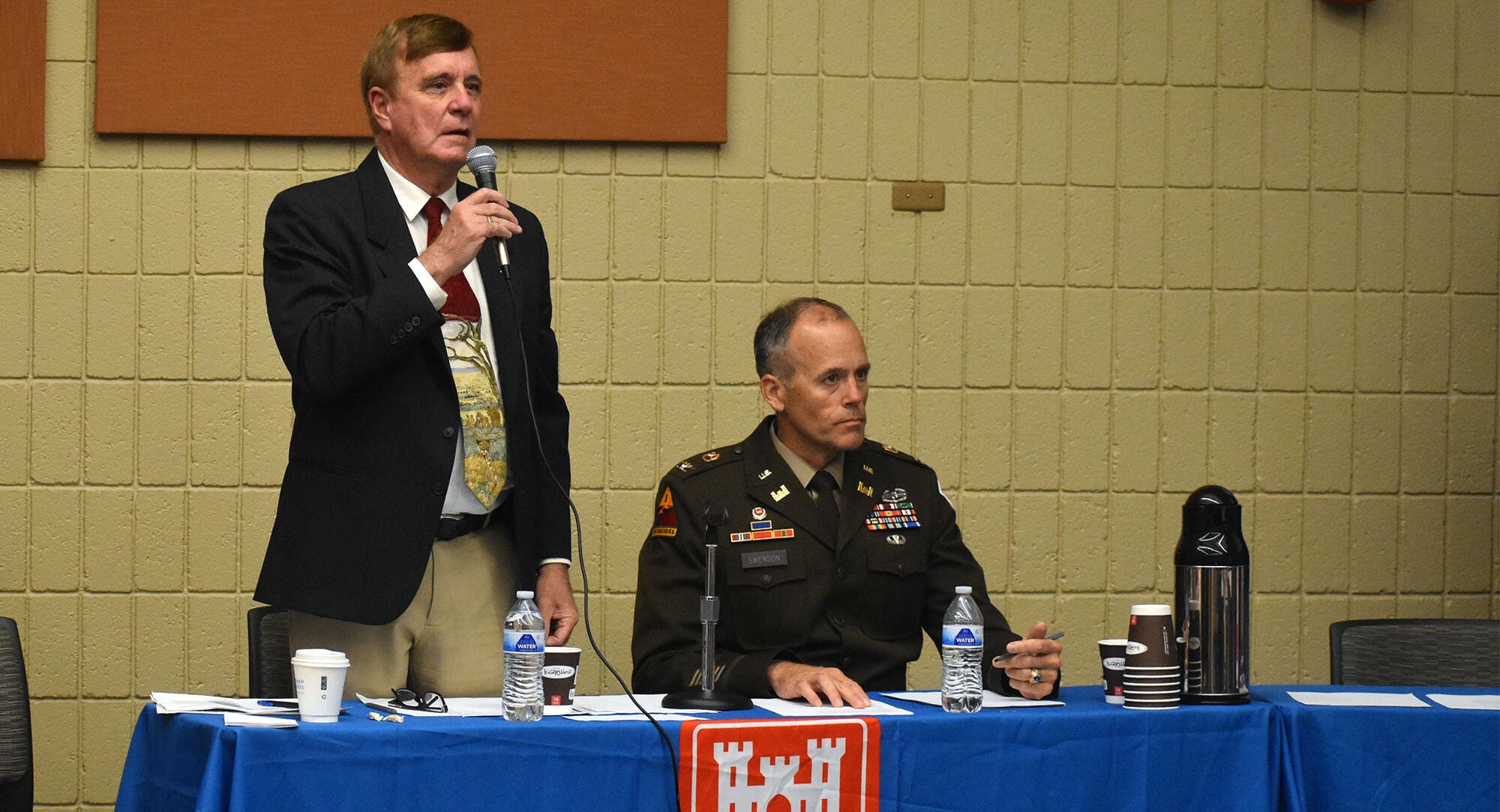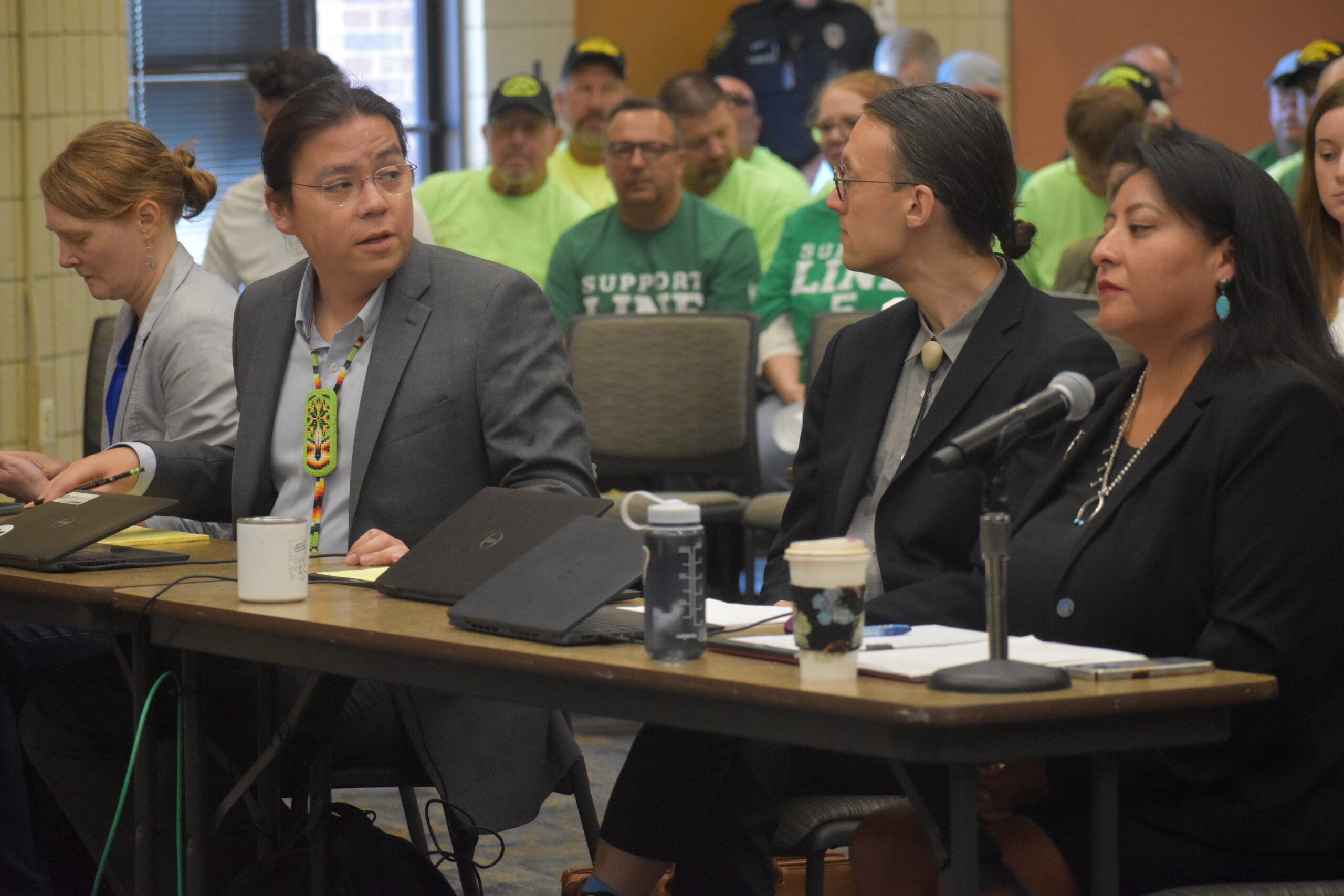A federal judge has ordered the Bad River tribe and Canadian energy firm Enbridge Inc. to come up with a joint proposal to shut down and purge an oil and gas pipeline should erosion worsen at the Bad River and threaten a “catastrophic” rupture.
The Bad River Band of Lake Superior Chippewa sued the Canadian energy firm in federal court in 2019 to shut down and remove Line 5. The lawsuit followed the tribe’s decision not to renew easements for the pipeline that had expired in 2013 on a dozen parcels of tribal land. Tribal officials argue the pipeline poses an unreasonable risk to health and safety as erosion at an area referred to as “the meander” threatens to expose and rupture Line 5. In response to Bad River’s lawsuit, Enbridge is planning to build a $450 million pipeline that would run 41 miles around the Bad River reservation.
The nearly 70-year-old Line 5 carries up to 23 million gallons of oil and natural gas liquids per day and spans 645 miles from Superior through northern Wisconsin and Michigan to Sarnia, Ontario. Enbridge contends the pipeline has been safely operating, serving as a vital energy link to the region.
News with a little more humanity
WPR’s “Wisconsin Today” newsletter keeps you connected to the state you love without feeling overwhelmed. No paywall. No agenda. No corporate filter.
In a Monday order, U.S. District Judge William Conley said risk of a significant rupture exists that could result in “catastrophic” impacts to the Bad River watershed and Lake Superior.
“Thus, the court finds that a rupture of Line 5 at the meander would be a substantial and unreasonable interference with the Band’s and the public’s rights,” wrote Conley. His ruling allows the pipeline to continue operating, but requires Enbridge to come to an agreement with the tribe on emergency measures to avoid a spill.
Conley noted the nearest shutoff valves are 14 miles apart on either side of the meander. He said that makes it unlikely that they could be activated in time to prevent roughly 20,000 gallons of crude and natural gas liquids in that segment of pipe from spilling into the Bad River.
The judge ordered Enbridge and Bad River to meet and discuss installation of emergency shutoff valves, a protocol for shutting down and purging the line, and projects that could slow further erosion by Dec. 17. The two must submit a joint proposal or each must offer their own proposal if no agreement can be reached by Dec. 24.
“We look forward to meeting with the Bad River Band to discuss these issues,” Juli Kellner, an Enbridge spokesperson, said in a statement. “In the meantime, the Line 5 pipeline will continue to safely operate.”
Bad River Tribal Chairman Mike Wiggins, Jr. did not immediately respond to a request for comment Monday afternoon.
Sierra Club Wisconsin Director Elizabeth Ward told Wisconsin Public Radio she’s glad the judge recognized the tribe’s concerns regarding a potential spill.
“He made it pretty clear that there was a threat to that area, and that there needed to be action taken to ensure there’s not an oil spill in the region,” said Ward.
Even so, Ward said she’s disappointed the judge didn’t align with Bad River’s recommendation that the best way to avoid a spill is to shut down the pipeline.
Bank erosion on the river poses the greatest risk of rupturing Line 5 on the reservation, according to the order. Just under 30 feet of riverbank remains between the Bad River shoreline and the pipeline. Despite its proximity to the pipe, the bank has remained stable due to below average flooding.
Other reasons why Line 5 appears likely to fail at the Bad River include wearing of channels designed to reduce flooding or scouring at the bottom of the river bed, under which the pipe is buried.
But the court found Bad River had yet to establish an imminent threat of a spill there, saying a flood event beyond one occurring once every 500 years would still be unlikely to raise immediate concerns about the pipe’s integrity. Conley added the risk of a rupture is at least a year away.
The judge found Enbridge has made efforts to avoid a spill at the Bad River through its own shutdown and purge plan, installation of shutoff valves, and remediation plans. He also said the tribe failed to meaningfully engage with Enbridge to address the risk of further erosion, noting the company’s efforts to install rip rap have successfully addressed similar problems on the Bad River and elsewhere.
“For all of these reasons, the Band has not yet shown that its specific shutdown and purge plan, much less an immediate shutdown of Line 5, is the best or even a reasonable way to prevent a catastrophic rupture of Line 5 in the near term after balancing all the interests of the Band and the public,” wrote Conley.
The judge also denied Enbridge’s counterclaims that Bad River unlawfully denied Enbridge access to conduct operations, inspections and maintenance of Line 5.
Conley previously ruled in September that Enbridge trespassed on tribal lands and profited at the expense of the Bad River tribe by continued operation of its Line 5 pipeline. Conley’s ruling Monday did not address what Enbridge should pay the tribe in monetary damages for trespassing on tribal lands, which is likely to be addressed at a later date.
Enbridge had proposed paying Bad River as little as $4,300 per year or up to $562,959 for each year since its easements expired until the company’s proposed reroute is built. The tribe had urged the court to reject those payments in lieu of a shutdown, saying monetary damages were inadequate compensation and only incentivized further trespass.
“Instead of creating an incentive for Enbridge to leave the Reservation and for the market to develop alternatives to the trespassing pipeline, Enbridge’s suggested remedy would give Enbridge an incentive to remain indefinitely,” said the tribe in a court filing.
Conley and Enbridge have opposed an immediate shutdown of Line 5, citing significant effects for regional economies and the U.S. trade relationship with Canada. The Canadian government has invoked a 1977 treaty with the U.S. that guarantees the flow of oil and natural gas across the border amid legal challenges to the pipeline’s operation in Wisconsin and Michigan.
“In the best of times, the Band’s desired shutdown injunction would create enormous disruptions for individuals and businesses in both the United States and Canada, as well as undermine the Transit Treaty’s objectives which include energy security,” said Enbridge in a court filing. “But during the current energy crisis—resulting in large part from Russia’s war in Ukraine—any shutdown injunction would be directly contrary to the national interest in energy security.”
Conley previously said he was inclined to require Enbridge to complete a new segment of Line 5 within five years. Bad River attorneys had urged the court to shut down the pipeline within 18 months. They argued any shortfall could be made up by other pipelines and reactivating existing rail and tanker facilities, according to court documents. The tribe also highlighted uncertainty over if or when Enbridge’s proposed reroute may be built, citing delays with the company’s Line 3 replacement and concerns among federal regulators.
WPR previously reported the U.S. Environmental Protection Agency found the state hasn’t yet fully analyzed potential impacts of a Line 5 reroute on water resources, climate change, and treaty rights. The agency issued nearly 200 recommendations for the Wisconsin Department of Natural Resources to strengthen its review.
Enbridge experts have said in court filings that shutting down Line 5 could result in the loss of thousands of jobs and billions in economic output in the Upper Midwest, as well as increase fuel costs by an estimated $20 million each year in Wisconsin. The tribe’s experts claim Enbridge is vastly overestimating losses from a shutdown.
Wisconsin Republican lawmakers, labor unions and the state’s largest business lobby support Enbridge’s plans to reroute Line 5. They have touted the 700 jobs that would be created along with the $135 million economic impact it would create for the state.
Environmental, tribal and citizen advocates oppose the company’s plans, saying the risk of a spill in Bad River and Lake Superior is too great. They pointed to Enbridge’s track record of spills in neighboring Michigan and Minnesota.
In Minnesota, state regulators recently ordered Enbridge to pay more than $11 million for water quality violations and aquifer breaches tied to construction of the company’s Line 3 replacement project. Enbridge is also responsible for one of the largest inland oil spills in the nation’s history after a pipeline ruptured in 2010, spilling 843,000 gallons of oil that flowed into Michigan’s Kalamazoo River.
In August, the DNR investigated a possible spill near the Bad River reservation after an Enbridge contractor reported contaminated soil south of Ashland. Enbridge has said only a tablespoon of product was found.
Wisconsin Public Radio, © Copyright 2025, Board of Regents of the University of Wisconsin System and Wisconsin Educational Communications Board.




